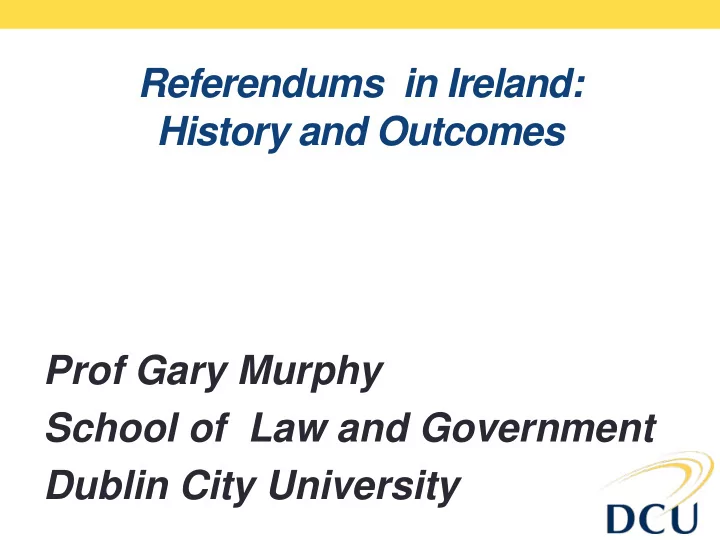

Referendums in Ireland: History and Outcomes Prof Gary Murphy School of Law and Government Dublin City University
Referendums in Ireland • Ireland is one of the few countries where every constitutional amendment requires the consent of the people • 38 proposed amendments • 27 approved and 11 rejected
Referendums in Ireland • 9 on moral issues • 9 on the European Union • 7 on voting • 4 on pitical, governmental and judicial framework • One on Northern Ireland • One on Children’s rights • Other 7 on relatively technical issues
Referendums in Ireland • Major changes have allowed • Ireland to take a full part in process of European Integration (1972, 1987, 1992, 1998, 2002, 2009, 2012) • Divorce to be legalised • Ireland to fulfil its part of the Northern Ireland Agreement • Legislation of same-sex marriage
Referendums in Ireland • 4 repeat referendums where the people have been asked to vote on the same proposal • Electoral System 1959 and 1968 • Divorce 1986 and 1995 • Nice 2001 and 2002 • Lisbon 2008 and 2009
Referendums in Ireland • Five referendums on abortion • 1983, three in 1992, 2002
Referendums in Ireland on the same day Year Topic of amendments 1968 Dáil constituencies and electoral system 1972 Recognition of religions and votes at eighteen 1979 Adoption and Seanad reform 1992 Abortion: Travel, Information and Right to Life [and General Election] 1998 Good Friday Agreement and Amsterdam Treaty 2001 Nice Treaty [1], Death penalty and International Criminal Court 2011 Judges pay and Oireachtas Inquiries [and Presidential Election] 2013 Court of Appeal and Seanad reform 2015 Same Sex Marriage and Presidential candidate age
Referendums in Ireland • Article 46 a powerful check on governments who might have wanted to make changes that do not have broad support across the political spectrum • The requirement that no changes to the constitution can be made without a referendum certainly enhances the status of the constitution amongst the people as its contents remain under their control.
Referendums in Ireland • Considering changing the constitution is an act of significant civic duty • In that context citizens need as much information as possible before doing so • Your constitution • Your decision
Recommend
More recommend